- Home
- Lisa Wingate
Before We Were Yours Page 6
Before We Were Yours Read online
Page 6
“It was lovely meeting you.” I attempt to excuse myself.
“Do you have to go?”
“I’m afraid I do. But I’ll ask my grandmother if she recognizes your name.”
She moistens her lips, emits a small cluck as they part. “You’ll come back, and I’ll share the story of the photo then.” Pivoting with surprising agility and without using her cane, she starts toward the door, adding, “Perhaps.”
She’s gone before I can answer.
I grab a better shot of the picture, then hurry off.
In the lobby, Ian is scrolling through emails on his cellphone. Apparently, he gave up on waiting in the car.
“Sorry that took so long,” I say.
“Oh, hey, no problem at all. It gave me the chance to sort my inbox.”
The nursing home director walks by and frowns, probably wondering why I’m still here. If I weren’t a Stafford, she’d undoubtedly stop and ask questions. As it is, she pointedly looks away and moves on. Even after two months back in South Carolina, it’s still strange, getting the rock-star treatment just because of my family name. In Maryland, I often knew people for months before they even realized my father was a senator. It was nice having the chance to prove myself as myself.
Ian and I proceed to the car, and we’re quickly bogged down in road construction traffic, so I use the time to call my mother. There will be no getting answers from her at home, with the DAR meeting being hosted there. After it’s over, she’ll be busy making sure every china plate and punch glass is back in its rightful place. That’s Honeybee. She’s an organizational whiz.
She also never forgets a name.
“Do we know a May Crandall?” I ask after she has requested that I “happen by” the DAR gathering so as to make an appearance, shake hands, and score a few points with all the right wives. Get the women, and you’ve got the vote, my father always says. Only foolish men underestimate their power.
“I don’t think so,” my mother muses. “Crandall…Crandall…”
“May Crandall. She’s around Grandma Judy’s age. Maybe they played bridge together?”
“Oh, goodness, no. The women Grandma Judy played bridge with are friends.” By friends, she means long-term acquaintances of the family with ties that are generations old for the most part. People of our social circle. “Lois Heartstein, Dot Greeley, Mini Clarkson…they’re all people you already know.”
“Okay.” Perhaps May Crandall really is just an addled old woman with a headful of jumbled memories that bear only a partial resemblance to reality. That doesn’t explain the photo on the nightstand, though.
“Why?”
“No real reason. I met her today at the nursing home.”
“Well, how sweet. That was kind of you to chat with her. Those people get so very lonely. She probably just knows of us, Avery. Many people do.”
I cringe and hope Ian can’t hear my mother’s end of the conversation. It’s embarrassing.
The question of the photograph still nibbles at the corner of my brain. “Who’s going by to see Grandma Judy tonight?”
“I was planning to. After the DAR meeting, if it’s not too late.” Mom sighs. “Your father won’t be able to.” Unfailingly, Honeybee holds down the family responsibilities when Dad’s job prevents him from doing so.
“Why don’t you stay home and rest after the meeting?” I suggest. “I’ll go.”
“But you’re coming by the meeting first?” Mom presses. “Bitsy is back from her trip to Lake Tahoe. She’s dying to see you.”
Suddenly, I have the horrible, desperate feeling a wild animal must experience when the door swings shut on a cage. No wonder my mother wants me to come by her DAR get-together. Bitsy is back in town. Given the party attendees, I can count on a multipronged interrogation about whether Elliot and I have set a wedding date, selected china and silver patterns, talked about a venue and season—indoor, outdoor, winter, spring.
We’re not in any rush. We’re both really busy right now. We’re just waiting to see what feels right isn’t what Bitsy wants to hear. Once she and the DAR ladies have me cornered, they won’t let me go until they’ve used every tool in their arsenal to get the answers they’re after.
I have a sinking feeling I might not be making it by Magnolia Manor this evening to ask Grandma Judy about the photo after all.
CHAPTER 6
Rill
In my dream, we’re free on the river. The Model T engine Briny fixed to the back of the boat drives us upwater easy, like we haven’t got any weight at all. Queenie sits up top of the cabin like she’s riding an elephant. Her head’s tossed back, her hair flowing out from under her feathery red hat. She’s singing a song she learned from an old Irishman in one of the shanty camps.
“Ain’t she pretty as a queen?” Briny asks.
The sun is warm, and the song sparrows sing, and the fat bass jump out of the water. A flock of white pelicans flies over in a big old arrow shape pointing north, which means the whole summer’s still ahead of us. There’s not a paddle-wheeler, or a flatboat, or a tug, or a barge in sight anywhere. The river is ours.
Only ours.
“And what’s that make you?” Briny asks me in my dream.
“Princess Rill of Kingdom Arcadia!” I yell out.
Briny sets a honeysuckle flower crown on my head and pronounces it so, just like the kings in the storybooks.
In the morning when I wake, there’s a sweet taste still in my mouth. It lasts until I open my eyes and think about why we’re all five in Queenie and Briny’s bed, flopped across the mattress like a fisherman’s catch, sweaty and slick.
Queenie’s not here. It barely gets through my head before I know what’s pulled me from my dream.
Somebody’s knocking on the door.
My heart jumps up, and I jump with it, tugging one of Queenie’s shawls over my nightgown while I cross the shanty floor. It’s Zede on the other side of the door, and even through the window glass, I can see that his white-whiskered face is long and sad. My gut turns into a slipknot.
Outside, the storm’s gone. It’ll be a nice day. The morning air’s turned warm and steamy, but I open the door and step outside and feel cold right through the old cotton nighty Queenie sewed a ruffle to because I’d gotten so tall. Queenie said a girl my age hadn’t oughta have her legs showing so much.
I pull the shawl tighter over my chest, not because of Zede or because I’ve got any woman parts to hide—Queenie says that’ll happen when it’s time, and it just ain’t time yet—but because there’s a boy in Zede’s jon boat. He’s a skinny thing, but tall. He’s got dark skin like a Cajun or an Indian. Not quite a man yet, I’d say, but older than me. Maybe fifteen or so. Zede’s always got somebody under his wing. He’s the grandpappy of the whole river.
The kid hides his face under a raggy newsboy cap, looking at the bottom of the boat, not at me. Zede skips the introducing.
I know what that means, but I wish I didn’t.
Zede’s hand feels heavy on my shoulder. It’s meant for a comfort, but I want to run away from it, scat off somewhere down the bank, my feet flying so fast they barely leave tracks in the washed-up sand.
Tears shove up my throat and I swallow hard. Fern’s face presses against the window behind me. Figures she’d wake up and follow along. She never lets me get far.
“Queenie’s babies didn’t make it.” Zede’s not one to chase round the bush with his words.
Something dies inside me—a little brother or sister I was planning to hold like a new china doll. “Not either one?”
“The doc said no. Couldn’t save neither of ’em. Said it wouldn’t of made no matter if’n Briny’d got yer mama to the hospital sooner. The babies just wasn’t meant for this world, that’s all.”
I shake my head hard, trying to wick those words out of my ears like water after a swim. That can’t be true. Not in Kingdom Arcadia. The river is our magic. Briny always promised it’d take care of us. “What’d Briny say?”<
br />
“He’s pretty broke up. I left him there with yer mama. They had some hospital papers to sign and whatnot. They hadn’t told her ’bout the babies yet. Reckon Briny will when she’s woke up good. She’ll be all right, doc said.”
But I know Queenie. She won’t be all right. Nothing makes her happier than a brand-new, sweet baby to cuddle.
Zede tells me he figures he’d better go back to the hospital. Briny wasn’t in a good way this morning. “I was gonna see if’n there wasn’t a woman down in the river camp who’d come look after y’all young’uns, but the pickin’ was sparse. Been some trouble with the police, and most all the shanty folk done took to the river. I brung Silas to watch out over ya till I can git yer daddy back home.” He motions to the boy in the boat, who looks up, surprised. He didn’t know that Zede meant to leave him, I guess.
“We can look after ourselves all right.” Mostly, I just want Queenie and Briny to come home and get us on down the river. I want that so bad, I hurt for it deep underneath the knot in my belly.
“We ain’t got nothin’ to feed him.” Camellia is in the door now, offering up her two cents.
“Well, good mornin’ to you, Miss Rosy Ray a’ Sunshine.” Zede calls Camellia that all the time on account of she’s the exact opposite of that very thing.
“I was gonna go gig us some frogs.” She announces it like she’s been made captain of the Arcadia.
“No, you ain’t,” I tell her. “We’re not supposed to leave the boat. None of us.”
Zede points a finger at my sister. “You kids stay put.” He narrows an eye back toward the river. “Don’t know what’s spooked the folks out of Mud Island camp. It’s good y’all are over in this li’l backwater by yerselves, anyhow. Just keep quiet. Don’t be callin’ any attention or nothin’.”
Something new weighs on my chest. Something heavy. Worry scratches a setting spot inside me and takes up nesting. I don’t want Zede to leave.
Fern sidles over to hang on my leg. I pick her up and snuggle her wild curls under my chin. She’s a comfort.
Gabion comes out, and I pick him up too, and their weight pins my feet to the floor. Queenie’s shawl binds tight around my shoulders and squeezes into my skin.
Zede puts me in charge again, and he brings the boy, Silas, onto the Arcadia. Unfolded, Silas is taller than I thought. He’s skinny as a rail, but he’d be handsome if it weren’t for the busted lip and the shiner. If he was hoboing trains, like Zede said, he’s lucky the railroad bulls didn’t do worse to him.
He hikes himself up on the porch rail, like that’s where he means to stay.
“You watch after them now,” Zede tells him.
Silas nods, but it’s clear enough he ain’t happy about it. A Cooper’s hawk flies by looking for prey, and he watches it pass, then keeps his face pointed toward Memphis.
Zede leaves food behind—a bag of cornmeal, a bundle of carrots, ten eggs, and some salt fish.
Silas watches as Zede climbs into his boat and disappears.
“You hungry?” I ask him.
He turns my way, and it’s then I remember I’m in my nighty. I feel the sticky air touching my skin where the neck pulls low from the babies on my hips.
Silas looks away, like he noticed. “Reckon.” His eyes are dark as midnight on water. They reflect everything he looks at—a heron bird fishing nearby, branches drooping from a half-broke tree, the morning sky with its foam-white clouds…me. “You cook?” The way he says it makes it sound like he’s already decided I can’t.
I lift my chin, square up my shoulders. Queenie’s shawl cuts in deeper. I don’t think I like Silas much. “Yeah. I can cook.”
“Pppfff!” Camellia spits.
“You hush up.” I set down the little kids and push them toward her. “And watch after them. Where’s Lark?”
“Still in bed.”
“Look after her too.” Lark can slip off quick and quiet as a whisper. One time, she laid up in a little clearing by a creek and fell flat asleep, and it was a whole day and half the night before we found her. Scared Queenie clean outa her mind.
“Reckon I better make sure you don’t burn the place down,” Silas grumbles.
I decide it right then: I don’t like this boy at all.
But when we go through the door, he looks my way, and his split lip turns upward on one side, and I think maybe he ain’t so bad.
We light a fire in the stove and cook the best we can. Between Silas and me, neither of us knows much. The stove is Queenie’s territory, and I’ve never cared a thing about it. I’d rather be outside watching the river and its animals and listening to Briny spin stories about knights, and castles, and Indians out west, and far-off places. Briny’s seen the whole world, near’s I can figure.
Silas has seen a bit himself. While we cook and sit down to eat, he tells tales about riding the rails, and thumbing his way across five states, and scratching up food in hobo camps, and living off the land like a wild Indian.
“Why ain’t you got a mama?” Camellia asks as she finishes the last of a hoecake that’s just a little bit burnt on the edges.
Lark nods, because she wants to know too, but she’s too shy to ask.
Silas waves a fancy silver fork that Briny dug up in the sand by the wreck of an old riverboat. “Had a mama. Liked her all right, till I was nine. Then I left and ain’t seen her since.”
“How come?” I look hard at Silas to see if he’s teasing. As much as I miss Queenie already, I can’t imagine being away from your mama on purpose.
“She married a fella that liked drinkin’ whiskey and handin’ out whippin’s. I took me a year of that, and I figured I was better off makin’ my own way.” The sparkle leaves his eyes for a minute, and there’s nothing left but dark. But quick as it’s there, he shrugs and smiles, and the little dents come back in his cheeks. “I struck off with a harvest crew that was movin’ through. Went clear up to Canada, pickin’ apples and combinin’ wheat. After that was over, worked my way back south again.”
“When you was just ten?” Camellia smacks her lips to let him know she’s not believing a word of it. “You done all that? I just bet.”
Smooth as a cat, he turns in his chair, lifts up the tail of his faded-out shirt, and shows us the scars across his back. All five of us jerk away from the table. Even Camellia hasn’t got a smart-mouthed answer now.
“Be glad if you got a nice mama and daddy.” Silas looks hard at her. “Don’t ever get it in your head to leave them behind, if they’re good to you. Some sure enough ain’t.”
We all go quiet for a minute, and tears build in Lark’s eyes. Silas sops up the last of his egg and drinks a swig of water. He looks at us over the rim of the tin cup and frowns like he can’t figure what we’re so long faced about. “Say, li’l bit”—he reaches out and tweaks Lark’s nose, and her lashes flutter like butterfly wings—“did I ever tell you about the night I met Banjo Bill and his dancin’ dog Henry?”
Just like that, he’s off on another story and then another. Time goes by in a wink while we finish the last of the food and then clean up the mess.
“Your cookin’ ain’t half bad.” Silas licks his lips after we’re done washing dishes in the pail on the porch. By then, Fern’s got her dress on wrong side out, because she’s changed herself out of her nighty, and Gabion’s running around half-naked, looking for somebody to clean him up after he sneaked to the outhouse off the back of the shanty all by himself. It’s a good thing he didn’t fall right through into the river. There’s no bottom on a shantyboat outhouse, just the water.
I tell Camellia to take him on the porch and dunk his rear in the river and then dry him off. It’ll be easiest.
Camellia’s nostrils flare. The only thing that scares her in the whole wide world is poop. Which is exactly the reason I’m making her go clean Gabby. She deserves it. She hasn’t helped with a thing all morning.
“Mellia! Mellia!” our baby brother cheers as his fat little legs wobble him toward the doo
r, bare bottomed. “I metsy!”
My sister sneers at me, then whips open the screen and drags Gabion out, pulling him up by one arm, so that he stands on his tippy-toes.
“I’ll do it,” Lark whispers, hoping to end the fight.
“You let Camellia see after it. You’re not big enough.”
Silas and I look at each other, and he smiles a little. “Ain’t you ever gonna get dressed?”
I look down and realize I never did change and never even thought about it, I was so caught up in Silas’s stories. “Guess I better,” I say, and laugh at myself and get my dress down from the hook, then stand there holding it. “You gotta go outside, though. And no peeking.”
There’s been a funny little thought in my head while Silas and me been cooking and taking care of the babies. I’ve been play-pretending like I was the mama and Silas was the daddy and this was our house. It’s helped me not think about Queenie and Briny still being gone.
But there’s no way I’d get undressed in front of him, or anybody. I’ve come up big enough this past year that I dress behind the curtain in the shanty, like Queenie does. I wouldn’t stand still for somebody seeing me in the altogether any more than I’d let somebody whip me across my back and leave scars.
“Heck,” Silas says, and rolls his eyes, “why’d I be lookin’? You ain’t nothin’ but a kid.”
My skin goes hot from head to toe, and my cheeks boil.
Outside the screen door, Camellia laughs.
I blush harder. If I could, I’d knock her and Silas both off into the water right now. “And take the little kids out with you,” I snap. “A woman needs privacy.”
“How would you know anythin’ about that? You ain’t no woman. You ain’t nothin’ but a li’l curly-headed Kewpie doll,” Silas teases, but I don’t think it’s funny, especially when Camellia can hear. On the porch, she’s lined up with Fern and Lark, enjoying the show.
Every muscle in my body goes stiff. I don’t get mad easy, but when I do, it’s like a fire inside me. “Well, you ain’t nothin’ but a…a stick! A stick boy. The wind don’t even have to slow down to blow around you. That’s how skinny you are.” I square up on him, hateful as I can, and poke my fists into my hips.

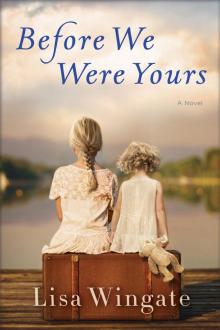 Before We Were Yours
Before We Were Yours A Sandy’s Seashell Shop Christmas
A Sandy’s Seashell Shop Christmas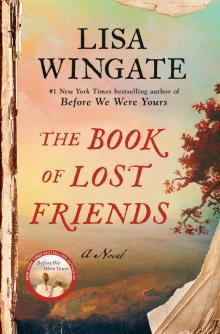 The Book of Lost Friends
The Book of Lost Friends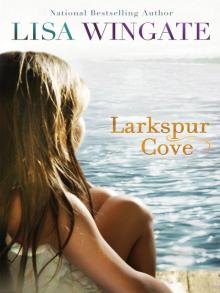 Larkspur Cove
Larkspur Cove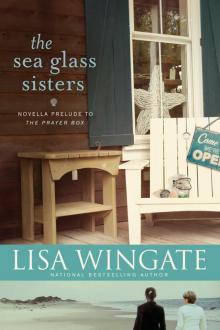 The Sea Glass Sisters
The Sea Glass Sisters The Language of Sycamores
The Language of Sycamores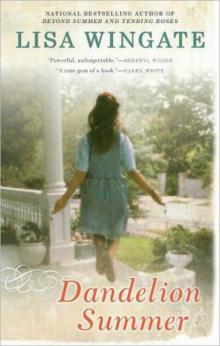 Dandelion Summer
Dandelion Summer Word Gets Around
Word Gets Around Beyond Summer
Beyond Summer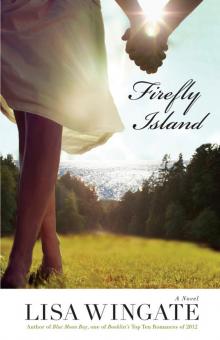 Firefly Island
Firefly Island The Tidewater Sisters: Postlude to The Prayer Box
The Tidewater Sisters: Postlude to The Prayer Box Talk of the Town
Talk of the Town![Blue Sky Hill [01] A Month of Summer Read online](http://i1.bookreadfree.com/i1/03/29/blue_sky_hill_01_a_month_of_summer_preview.jpg) Blue Sky Hill [01] A Month of Summer
Blue Sky Hill [01] A Month of Summer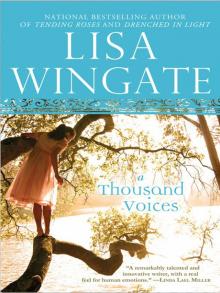 A Thousand Voices
A Thousand Voices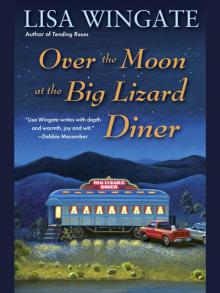 Over the Moon at the Big Lizard Diner
Over the Moon at the Big Lizard Diner Never Say Never
Never Say Never Good Hope Road
Good Hope Road The Summer Kitchen
The Summer Kitchen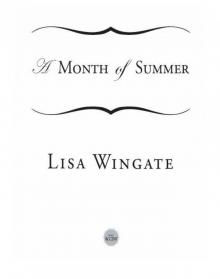 A Month of Summer
A Month of Summer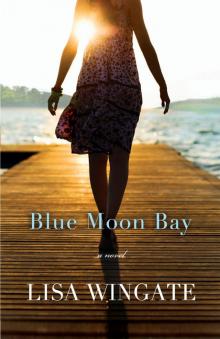 Blue Moon Bay
Blue Moon Bay Drenched in Light
Drenched in Light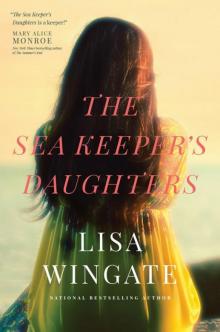 The Sea Keeper's Daughters
The Sea Keeper's Daughters